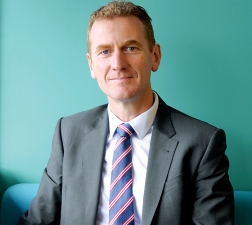Search

 Andrew Hampton. Photo supplied.Mid Canterbury-grown Andrew Hampton sees the electronic world from a unique viewpoint, as head of the national cyber security agency. Reporter Linda Clarke catches up with him.
Andrew Hampton. Photo supplied.Mid Canterbury-grown Andrew Hampton sees the electronic world from a unique viewpoint, as head of the national cyber security agency. Reporter Linda Clarke catches up with him.
The head of New Zealand’s cyber security agency was once a part-time thistle grubber on his parents’ Mid Canterbury farm.
The job was boring, recalls former Ashburton College student Andrew Hampton, but it taught him to work hard. Farming, as it turned out, was not his calling though he can still properly construct a hay stack on the small lifestyle block he owns just outside of Wellington.
Stacking hay and fixing fences uses muscle memory from his youth, and helps balance the workload from his high-profile job as head of the Government Communications Security Bureau (GCSB).
Hampton has spent his working life balancing the best interests of New Zealanders.
As head of the GCSB, he leads an organisation that is charged with protecting the country from cyber-attacks and gathering intelligence on potential threats.
He says New Zealand’s geographical isolation once kept it safe, but now the click of a mouse could unleash widespread disruption or theft of important trade and security secrets.
The GCSB works closely with the New Zealand Security Intelligence Service and is, in the language of past world wars, a signals intelligence agency. Back then, the work was breaking codes and intercepting messages, and the work was top secret. Our GCSB gathers intelligence by electronic means in accordance with Government priorities and helps protect nationally-important organisations in the public and private sector from malware and cyber-attacks.
Hampton says it’s all about balancing the great opportunities that are available now New Zealand can easily connect to the rest of the world against some potentially significant threats in return.
These threats can come from individuals, groups and other countries. The GCSB’s around 500 staff work hard in a challenging, constantly-changing world of technology to make sure the cyber attacks don’t succeed.
The agency’s latest report refers to over 300 cyber incidents involving nationally significant organisations in the past year and Hampton says 134 of those had indicators of being state-sponsored activity.
Not only is the number of state-sponsored activity increasing, the nature of the threats is becoming more complex and the sources of them more diverse.
Hampton says the work is fascinating and he travels overseas a lot. New Zealand is part of the Five Eyes partnership and shares intelligence with Australia, Canada, the United Kingdom and the United States.
The workings of the wider world have interested him since he was a child.
He went to tiny Flemington School (now closed) and had literally outgrown the place when he departed at 6ft 2in at the end of Year 8 (Form Two in his day) in 1983.
He has lots of fond memories of the country school, where the roll was never more than 30 and encompassed the range from new entrants to Year 8. Not surprisingly, given his height, he was a handy runner and Ashburton College PE teacher Trevor Cochrane was pleased to add him to his secondary school athletics squad when he moved up.
Farm life was busy. His father Peter ran a sheep and cropping operation, plus a piggery. It was Andrew’s job, with his big brother, to feed the pigs every Saturday and Sunday and there was always plenty of thistle grubbing in the school holidays.
“As much as I loved growing up on the farm, I was always interested in the wider world. I read the newspapers.
“I listened to the radio. I was fascinated at what was happening nationally and internationally.”
He distinctly remembers the day in April, 1982, when he was off to visit his orthodontist in Christchurch and Argentina invaded and occupied the Falkland Islands. It was the start of the Falklands War, a 10-week battle between the United Kingdom and Argentina.
He also remembers, rather embarrassingly, that day because they parked near the Arts Centre in Christchurch and a load of weaner pigs escaped from their trailer.
At secondary school, he remembers when the Labour Government came to power in 1984. It was the first Labour Government to win a second consecutive term since the 1930s.
“I also remember sitting at school when the Rainbow Warrior drama was unfolding and then in October, 1987, when the world’s stock markets crashed.”
His teachers at the time found a way to turn these big world events into learning opportunities.
Hampton says Mark Gleason (and his pioneering NZ law class) and Lynne Macdonald (for her outstanding reading suggestions) were amongst his favourites.
He embraced life at AshColl, which was one of the biggest in the South Island at the time with around 1500 students.
He ran the 400m and 800m and set records, and he was in a rock band.
He remembers teaming up with brothers Mark and Grant Walsh and Ben Gordon in a 4 x 400m relay team that won a South Island title and went to nationals.
By Year 11, his attention turned to study, giving up maths and science to follow his passion for English, history, geography and classics.
“I am a firm believer that people should study what they find most interesting and be as broad as they can for as long as they can.
“The really important skills are the ability to analyse different types of information, the ability to connect in writing or verbally, the ability to construct an argument and present that and the ability to hear a different view and modify your own.”
With the blessing of his mum Pam, the first in her family to go to university, Hampton eventually headed to the University of Canterbury.
He studied the arts, naturally, and came away with a Bachelor of Arts with Honours in history and political science. He then completed a Master of Arts in history and graduated with distinction.
He focused initially on New Zealand history and the country’s political systems, and that started an interest in the Treaty of Waitangi.
His masters thesis looked at how New Zealand’s political system had evolved through the 1980s and early 1990s to better take account of Maori interests with treaty settlements, iwi devolution and the move towards MMP. It was a unique paper. To this day he believes that a proportional-based electoral system is good for the country and better reflects its diverse society.
“One of the reasons we have greater political stability than some other countries is because we have an electoral system which better reflects the range of different views that exist in society and incentivises parties to represent them and find ways in which you can reconcile them and work together.
“I notice in my current role, when I travel quite a bit and have exposure to other political systems, that we are pretty lucky with what we have in New Zealand.”
Hampton took a break between degrees to go overseas and flatted in London with seven others, enjoying life and weekend trips to Europe.
Returning, he finished his university studies, then worked for Te Puni Kokiri (Ministry of Maori Development), working on international indigenous rights issues. He was part of a government delegation to the United Nations in Geneva and says it was a great opportunity so early on in his career as a civil servant.
Then for eight years he was part of the Ministry of Justice’s Office of Treaty Settlements.
“It was a fantastic opportunity to learn more about our country and Maori culture and perspectives, and at the same time working out how to best resolve the very significant grievances of iwi in a way that works for all of New Zealand.”
Hampton then changed roles within the ministry and became a senior courts administrator, overseeing the introduction of a digital transcription service (sped up the court process through remote transcription) and finding court space for Christchurch post-earthquakes.
He next had a lead role in the Ministry of Education, dealing with the controversial closures of some Christchurch schools and addressing issues around Novopay.
Hampton has been in charge of the GCSB since 2016.
While he cannot talk about everything that he and the agency do, some of which is covert and involves access to classified information, his mission is to make the agency more open and accountable, and to build public trust and confidence in it. “In the past the agency was not as open as it could have been.”
Part of the agency’s work in the past few years has been the development of a cyber security capability Cortex, which has saved New Zealand’s organisations of national significance some $67 million over the past two years.
Hampton says the agency works only in the national interest and attracts some of the brightest and best people in their fields.
These include foreign language experts, communications and cryptography specialists, engineers, technicians, legal, policy and support staff.
He maintains a strict separation between work and home life, because it’s a job where you can’t really take your work home.
There are no cyber rules for his children, who would rather ride horses, read books, or make music than be glued to their cellphones.
And he is still in touch with his rock band mates Mark Hooper and Walt Friedal (they were called Barbed Wyre back in the day), and when he puts on a record from his vinyl collection he thinks of Record World in the Arcade.
Visiting there on a Friday night was the highlight of his week as a teenager, now he has the electronic world at his feet.
By Linda Clarke © The Ashburton Guardian - 8 February 2019


